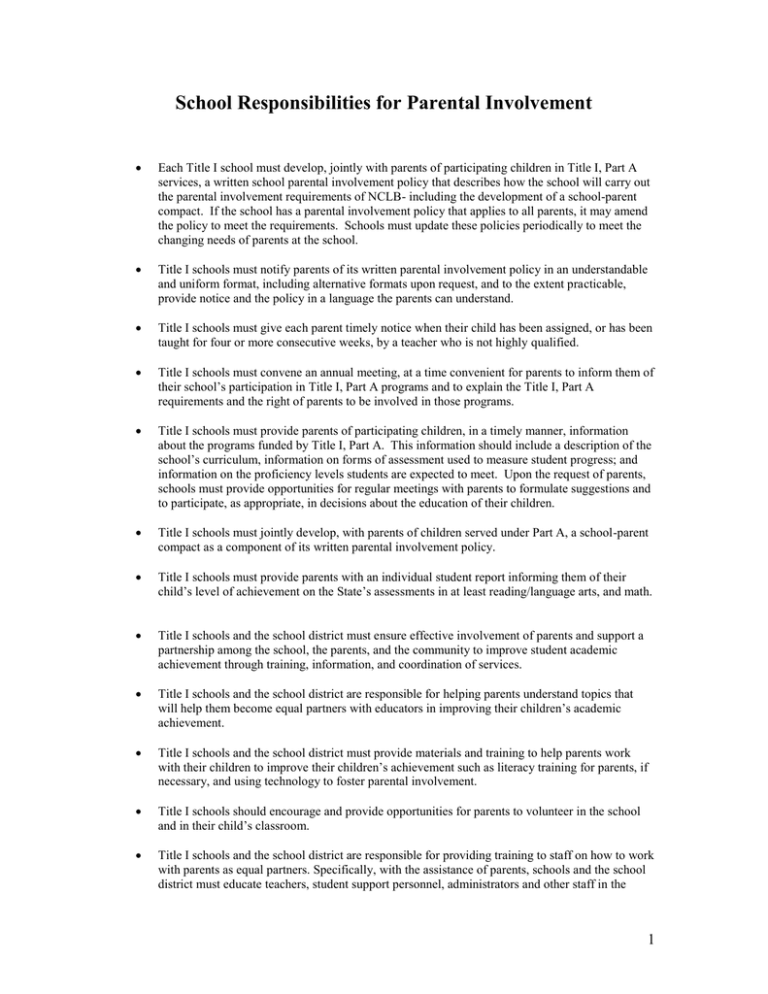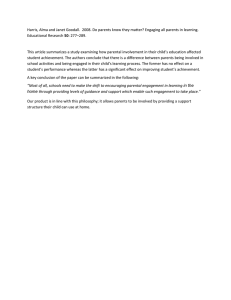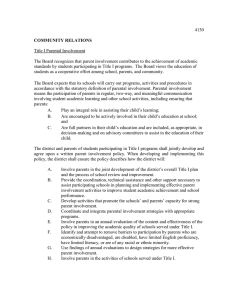School Responsibilities for Parental Involvement
advertisement

School Responsibilities for Parental Involvement Each Title I school must develop, jointly with parents of participating children in Title I, Part A services, a written school parental involvement policy that describes how the school will carry out the parental involvement requirements of NCLB- including the development of a school-parent compact. If the school has a parental involvement policy that applies to all parents, it may amend the policy to meet the requirements. Schools must update these policies periodically to meet the changing needs of parents at the school. Title I schools must notify parents of its written parental involvement policy in an understandable and uniform format, including alternative formats upon request, and to the extent practicable, provide notice and the policy in a language the parents can understand. Title I schools must give each parent timely notice when their child has been assigned, or has been taught for four or more consecutive weeks, by a teacher who is not highly qualified. Title I schools must convene an annual meeting, at a time convenient for parents to inform them of their school’s participation in Title I, Part A programs and to explain the Title I, Part A requirements and the right of parents to be involved in those programs. Title I schools must provide parents of participating children, in a timely manner, information about the programs funded by Title I, Part A. This information should include a description of the school’s curriculum, information on forms of assessment used to measure student progress; and information on the proficiency levels students are expected to meet. Upon the request of parents, schools must provide opportunities for regular meetings with parents to formulate suggestions and to participate, as appropriate, in decisions about the education of their children. Title I schools must jointly develop, with parents of children served under Part A, a school-parent compact as a component of its written parental involvement policy. Title I schools must provide parents with an individual student report informing them of their child’s level of achievement on the State’s assessments in at least reading/language arts, and math. Title I schools and the school district must ensure effective involvement of parents and support a partnership among the school, the parents, and the community to improve student academic achievement through training, information, and coordination of services. Title I schools and the school district are responsible for helping parents understand topics that will help them become equal partners with educators in improving their children’s academic achievement. Title I schools and the school district must provide materials and training to help parents work with their children to improve their children’s achievement such as literacy training for parents, if necessary, and using technology to foster parental involvement. Title I schools should encourage and provide opportunities for parents to volunteer in the school and in their child’s classroom. Title I schools and the school district are responsible for providing training to staff on how to work with parents as equal partners. Specifically, with the assistance of parents, schools and the school district must educate teachers, student support personnel, administrators and other staff in the 1 value and utility of the contributions of parents, and how to reach out to, communicate with, and work with parents, implement and coordinate parent programs, and build ties between parents and the school. Title I funds may be used to cover reasonable and necessary expenses associated with local parent involvement activities, including transportation and childcare. Title I schools and school districts should develop appropriate roles for community-based organizations, including faith-based organizations, and businesses in parental involvement activities. Title I schools and school districts, to the extent feasible and appropriate, must coordinate and integrate parental involvement programs and activities with the following programs: 1) 2) 3) 4) 5) 6) Head Start Reading First Public Preschools Even Start Family Literacy Programs Early Reading First Title III Language Acquisition Programs Title I schools must involve parents in an organized, ongoing, and timely way, in the planning, review, and improvement of Title I, Part A programs, includinga. b. The planning, review, and improvement of the school parental involvement policy; and The joint development of any schoolwide program plan. 2

